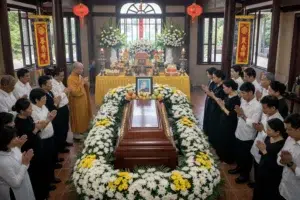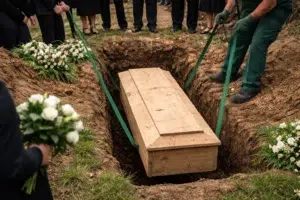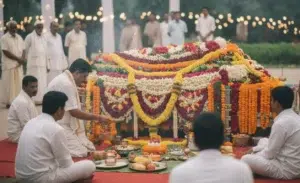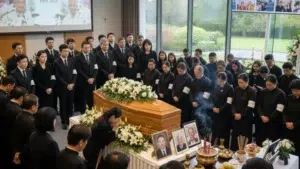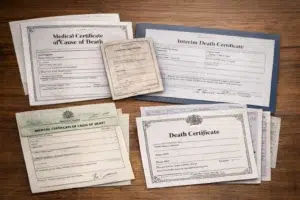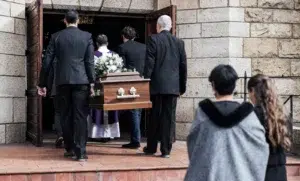When someone close to you dies, the responsibility of arranging their funeral can feel heavy, especially when you’re trying to make thoughtful choices during a time of grief.
One of the most important decisions you’ll face is selecting a funeral director. The right funeral director will not only handle the practical details with care and professionalism but also ensure that the service reflects your loved one’s values and your family’s wishes.
Here’s a guide to help you make an informed and confident choice.
1. Understand the Role of a Funeral Director
A funeral director’s role goes beyond logistical arrangements. While they do coordinate transport, documentation, care of the deceased, and the funeral service itself, their presence often provides emotional and practical support when it’s needed most.
They should:
- Register the death (or guide you through it)
- Liaise with the crematorium or cemetery
- Prepare and care for the body respectfully
- Organise the service according to your wishes (religious, secular, or cultural)
- Offer advice on flowers, music, notices, and memorials
- Handle paperwork for burial, cremation, and repatriation if needed
Read more about the role of a funeral director in the UK
2. Decide What Matters Most to Your Family
Before contacting funeral directors, think about what’s important to you and your family:
- Do you want a traditional, religious, or bespoke service?
- Are there specific cultural or spiritual customs that must be observed?
- Is your priority cost transparency, environmental considerations, or personalised service?
- Would you prefer a local, independent funeral director or one linked to a national chain?
Answering these questions helps narrow your options and ensures the funeral reflects your loved one’s life meaningfully.
3. Look for Memberships and Accreditations
In the UK, reputable funeral directors are often members of recognised professional bodies, such as:
- National Association of Funeral Directors (NAFD)
- The National Society of Allied and Independent Funeral Directors (SAIF)
- The Good Funeral Guide recommended status
- The Natural Death Centre affiliation for green or alternative funerals
These organisations uphold high standards of care, transparency, and ethical practice.
Gooding Funeral Services, for example, is a proud member of the NAFD and has been independently recognised by the Good Funeral Guide, offering you peace of mind during a vulnerable time.
4. Check Reviews and Testimonials
Take time to read online reviews or ask around in your local community. Word-of-mouth recommendations can be particularly helpful, especially from those who’ve experienced similar religious or cultural arrangements.
You can also look at case studies or testimonials on the funeral director’s website. Are families speaking about compassionate care? Personal touches? Clear communication? These are all positive indicators.
5. Ask the Right Questions
When speaking to a funeral director, don’t be afraid to ask detailed questions. A trustworthy provider will be transparent, sensitive, and happy to guide you. You might ask:
- What services are included in your fees?
- Can we tailor the service to suit our faith or cultural traditions?
- Do you offer pre-paid funeral plans?
- How do you handle repatriation, if needed?
- Are there eco-friendly options available?
6. Compare Costs Transparently
Funeral costs can vary significantly, so it’s important to understand what’s included. Since 2021, funeral directors in the UK have been legally required to publish standardised price lists on their websites and on their premises.
Be wary of vague or bundled costs—reputable providers will give you a detailed, itemised breakdown without pressure or upselling.
Gooding Funeral Services is committed to fair, honest pricing with no hidden charges. Whether you’re planning a simple service or a traditional ceremony with additional features, you’ll know exactly what to expect.
7. Consider Cultural and Religious Sensitivity
If your family has specific religious, spiritual, or cultural needs such as Hindu cremation rituals, Muslim washing and prayer traditions, or African-Caribbean celebrations of life make sure the funeral director is experienced and comfortable in supporting these practices.
At Gooding, we have extensive experience working with families from diverse backgrounds across Leeds, Manchester, Doncaster, Huddersfield, and Bradford, ensuring every ceremony is conducted with cultural integrity and respect.
8. Visit in Person, If Possible
If you can, visit the funeral home in person. You’ll get a sense of the atmosphere, facilities, and professionalism. Is the environment welcoming and respectful? Do staff members listen carefully and explain things clearly?
This visit can also reassure you about the care taken with your loved one behind the scenes, from the mortuary to the preparation room.
9. Trust Your Instinct
Beyond qualifications and cost, trust your gut. The right funeral director will make you feel supported, not rushed. They will listen, offer gentle guidance, and adapt to your needs rather than steering you in a particular direction.
If something feels off, whether it’s pressure, vagueness, or a lack of empathy, it’s okay to look elsewhere.
A Final Word from Gooding Funeral Services
Choosing a funeral director is not just about handling logistics. It’s about entrusting someone with a deeply personal responsibility. At Gooding Funeral Services, we honour that trust with professionalism, dignity, and genuine care.
As an independent, family-run funeral home, we’re here to support you through every step, whether you’re arranging a traditional funeral, a culturally specific ceremony, or a personalised farewell that reflects your loved one’s unique life.
Read more from our guide on funeral services in the UK.
If you’re unsure where to begin, we welcome you to speak with us. We’ll answer your questions without obligation and help you make the best decision for your family.
Pages You Might Like:
Funeral directors UK, Funeral services UK, Funeral Services in Leeds, Funeral directors Leeds, Funeral Directors in Bradford, Funeral Directors Bradford, Funeral Directors Manchester, Funeral Directors Huddersfield, Funeral Services in Doncaster, Asian Funeral Services, Hindu Funeral Services, Sikh Funeral Services, Caribbean Funeral Service


